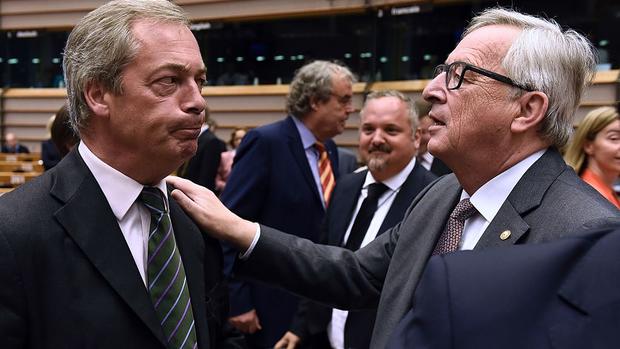EU to Britain: You can't have our cake and eat it too
LONDON -- European leaders were in the second day of an emergency summit in Brussels to discuss the future of the European Union. The United Kingdom, however, was not at day-two of the meeting, after the shock vote last week to leave the union.
EU leaders are urging Britain to set out its plans for Brexit as soon as possible. As CBS News correspondent Charlie D'Agata reports, Prime Minister David Cameron staked his career on the British people voting to remain in the EU. It was a gamble he lost.
He was sent packing from Brussels after dinner on Tuesday, and now, as the EU gets down to the business of plotting a future without Britain, Cameron will return to the Houses of Parliament in London, to face the music as his nation's economy reels.
D'Agata says Europe's heavy-hitters came to play ball in Brussels on Wednesday. It will be the first time in more than 40 years that Britain is, for all intents and purposes, on the other team.
Even the president of tiny EU member Lithuania made that clear:
"Today is about us, what we are going to do about our unity," said President Dalia Grybauskaite, in English.
That message of unity -- without the British -- was reinforced later in the morning, with
Before he was sent home, Cameron did what he could on Tuesday to salvage what's left of a messy breakup.
"While Britain is leaving the European Union, it will not -- it should not, and in my view it won't -- turn its back on Europe," he said.
German Chancellor Angela Merkel said that if Britain's going, however, the sooner the better. She added that the United Kingdom shouldn't be allowed to "cherry-pick" the parts of EU membership it liked.
Dutch Prime Minister Mark Rutte, however, sounded more understanding -- even if it came as blatantly back-banded support. Yes, he said, the U.K. had collapsed "politically, monetarily, constitutionally and economically," but for those reasons it would be out of the question to demand the U.K. act right away.
Alone and isolated, the U.K. is under threat of an internal breakup, too.
Scottish First Minister Nicola Sturgeon was also in Brussels Wednesday, and unlike Cameron, she's still there Thursday, and still pushing her mission to keep Scotland in Europe.
The residents of Scotland (one of four nations that make up the U.K., with England, Wales and Northern Ireland) voted overwhelmingly to remain in the EU, something Scottish Member of the European Parliament Alyn Smith stressed in his own rousing speech in Brussels.
"We will need cool heads and warm hearts. But please, remember this," he told the room full of European representatives and leaders, "remember this: Scotland did not let you down. Please, I beg you, chers collègues (French for dear colleagues), do not let Scotland down now!"
He received a standing ovation.
The most difficult points for Britain to negotiate with the EU over the coming years will be the same ones that lead to the vote in the first place; Britain wants access to the EU free market, but insists on reforms to -- or exemptions from -- the freedom of movement of people across its national borders.
That attempt to "cherry-pick," as Merkel dubbed it, may be a tall order.
Hungarian Prime Minister Viktor Orban said after meeting with other EU leaders in Brussels on Wednesday that they had agreed Britain's future access to the open trading market would be contingent upon its adherence to the four basic freedoms laid out in the union's charter.
The free movement of people across EU borders is one of those fundamental freedoms.
French President Francois Hollande was emphatic on the topic as well, saying the EU "cannot move" on it's insistence that all four freedoms apply to any member blessed with any of them.
"The four freedoms: we cannot have the freedom of capital movement, the freedom of goods, the freedom of services and then say, 'when it comes to people, stay put!' Well no, it doesn't work that way. It is the four freedoms or none," Hollande said.
